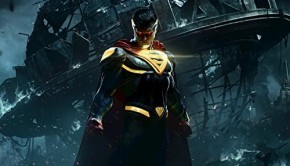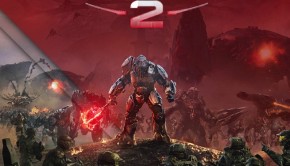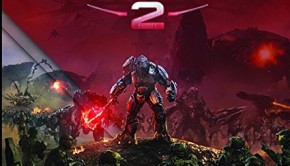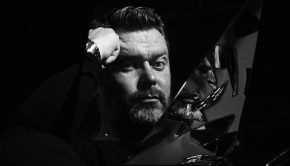David Christiansen Interview: The Orchestration of Dynamedion
 Dynamedion is the leading studio for soundtrack composition and sound design in the European video game industry. The company has pioneered orchestral recordings in game music with major scores to the SpellForce and Anno series. Having featured on nearly 200 projects to date, the company has branched out to encompass sound production for television, film, and mobile games too.
Dynamedion is the leading studio for soundtrack composition and sound design in the European video game industry. The company has pioneered orchestral recordings in game music with major scores to the SpellForce and Anno series. Having featured on nearly 200 projects to date, the company has branched out to encompass sound production for television, film, and mobile games too.
In this interview, Dynamedion’s lead orchestrator David Christiansen discusses the process of orchestration and orchestral recording from both a functional and artistic perspective. He draws generalities about the process while focusing in on major projects such as Alan Wake, Halo Legends, Darksiders: Wrath of War, and The Settlers 7. He also provides some insight into his classically-oriented background and extensive repertoire of film scores.
Interview Credits
Interview Subject: David Christiansen
Interviewer: Chris Greening
Editor: Chris Greening
Coordination: Pierre Langer
Interview Content
Chris: Welcome David Christiansen. As lead orchestrator of Dynamedion, could you tell us what your role involves and how it has influenced Dynamedion’s productions over the years?
David Christiansen: As the lead orchestrator my function is to write orchestral scores, so that the recording matches the composers’ vision. I am responsible for creating the scores and parts, and also communicate with the composers and on some projects with other orchestrators as well. In the end, I send the final scores to the orchestra, the conductor, and engineers. Furthermore I also handle the time scheduling, attend the recording sessions, and in some projects, take on the role of a music producer.

Chris: Game music orchestrations vary considerably in their approach. Some orchestrators treat it more like a craft — in order to make a score functionally compatible with an orchestra — whereas others take a more artistic approach. Where do you stand in this regard? What do you think defines a great orchestration?
David Christiansen: If you would compare a composer with a creator of a building, I would be the interior designer who cares about the right touches here and there. Many composers already know quite well how their interiors should look like, while others leave more creative decisions open. I like to communicate about my changes and ask for revisions, although most composers fully trust my decisions. The composers of Dynamedion have a very good idea of what they want and most of the time they give detailed pre-scores to me, such that in those cases I’m mostly responsible for all the details. I’m usually in charge of instrumentation issues and problems, subtleties such as accents, dynamics, and phrasing, and, of course, a clear score layout.
It is very important that every musician of the orchestra can sight-read their parts and there shouldn’t be inconsistencies in the scores and parts. This is the foundation for effective and time-efficient recording — making the score as convenient as possible for the musicians, so that they can focus on giving their best performance possible.
Chris: Let’s focus in on your last released work, Alan Wake. How did you work with Petri Alanko to establish such an intimate and emotional sound for this project? What were the main musical and in-game inspirations for you while orchestrating the title?
David Christiansen: Petri Alanko wrote a very intimate and melancholic soundtrack for Alan Wake. I transcribed the music from the mp3s he sent me. The emotional sound is caused by several factors: First, the decision to have a relatively small string ensemble with solo oboe to achieve a special, intimate sound. Emotionality arises in the arrangement, because the voices were often divided in divisi, with a broad sound and spread chords featuring many notes at once. The music changes all the time between con sordino, senza sordino, molto espressivo, and the dynamics are continuously adapting. All this would be nothing without the exceptional performance of the Halle State Philharmonic Orchestra, the conductor Bernd Ruf, and the top reference sound of Genuin Classics Recording.

Talking about inspiration I have to say that my main musical inspiration is inherent in the composition itself. Orchestrating can be like an interpretation of music. Every musician has his style to interpret music and so has every orchestrator. Sometimes you shouldn’t overdo it when interpreting, other times it is desirable that you make the music bigger or, for example, more fragile than it is in the original version.
Chris: The challenge of Halo Legends was very different. How did you adapt the relatively typical game soundtracks of the Halo series for the cinematic medium? How were you able to achieve so much colour and nuances in these interpretations for orchestra and chorus?
David Christiansen: It’s a great honour to record for Halo Legends. The Dynamedion composers did an exceptionally good job in transforming the more electronic and synthetic productions to a fresh orchestral sound and in composing additional music in the style of the original soundtrack. I like those compositions very much and it was a pleasure to work on this project with a satisfying musical result.
If we talk about colour and nuances, I must say that the orchestra is a really fascinating painting tool with endless possibilities in colour and combination of sounds, resulting in a perfect way to create emotion. For me music is a form of emotion translated to notes, harmonies, and structures and ideally comes to the ear of another individual and translates back to emotion. I guess that’s why it’s always nice to hear that people like the music you’ve worked on. Because you hope that this person was touched by those emotions.
Chris: Over the years, you have also worked on several epic projects, like Darksiders: Wrath of Warand Anno 1404. How do you use the orchestra and choir on such projects to achieve such a bold and immersive sound? Are there any artistic influences that are particularly important to you when orchestrating such works?

David Christiansen: Most of the time those epic projects are related to Hollywood Sound and Classical Music. On the other side when using choir there’s always a close connection to European Church Music and that’s one of my specialities. My first study was sacred music and, during that time, I sang several major works of church music. I guess that’s one of my main influences concerning choir music and choir arrangements.
The choir we usually record for projects like Anno 1404 and The Settlers 7 is the Philharmonic Choir Leipzig (a choir with 20 members of the MDR Broadcasting Choir). It’s always amazing to record those professionals with their spectacular voices. They just need the scores and the orchestral recordings on their headphones. Nothing more: no tone beforehand to find the right first note, no conductor. Most of the time they internally coordinate consistent use of vowels and timing of end-consonances. All this takes place in a very relaxed, hilarious atmosphere. Wow: Pure fun, perfect results.
Chris: In complete contrast, The Settlers 7 is known more for its mellow and humorous score. How did you adapt your orchestration to achieve such a sound? Was it an enjoyable contrast to work on this score away from more serious works?
David Christiansen: Yes one of the fun things about the The Settlers 7 soundtrack is the diversity of music in this game. There are humorous, light sounds throughout much of the score. However, on the other side, there are sacral moments and other pieces where the music feels like a feather and you could dance in orchestral colours.
And that’s what really makes me feel so happy about my job: The contrasts and different styles of music. Every project has its own feeling and its own sounds. In a way I’m a discoverer and I love to develop myself from project to project. And when the score is final it’s always a pleasure to listen to real music as an interpretation of those black dots on paper. This is a dazzling moment realizing that it was worth working hard on it. The best is that we record the music, so that many people can listen and enjoy it afterwards.

Chris: Now that we’ve discussed your main orchestration projects, it’d be interesting to hear more about you as a person. Could you tell us about your musical background, influences, and education? What ultimately led you to become involved with music production at Dynamedion?
David Christiansen: As a five-year-old boy I eagerly wanted to learn to play the piano. After piano lessons starting at that age, I started to play another fascinating instrument at 12: church organ. I started my first job as an organist at the age of 14, while I was still in school. I loved synthesizers and electronic music as well, yet decided to study classical music, not popular music. I took a diploma in sacred music, including piano, organ, composing, instrumentation, conducting, counterpoint, improvisation, Gregorian Chants, cembalo, and all those things. I loved to play recitals with Widor-Symphonies and works by J.S. Bach, Pachelbel, Messiaen, Dupré and Max Reger.
After my studies I took one year to travel to Australia and New Zealand and, in this time, I decided to make my dreams become true and to become a film composer. In 2008, some days after finishing my studies in film music and sound design in Ludwigsburg (Germany), I was invited to FMX Conference to take part on a discussion about composition for Video Games. Pierre Langer also took part in this discussion and afterwards he asked me if I was interested in working on some orchestrations for Dynamedion. From project to project the amount of cues increased. In the end I was asked to become lead orchestrator of Dynamedion.
Chris: Away from orchestrations, you have also scored a number of film productions of your own. Could you elaborate on your experiences as a film composer? What were the main highlights for you so far?
David Christiansen: I love to work for film very much and I have worked on more than 40 short film projects and commercials. The highlights so far were two documentaries for ZDF (biggest TV station in Europe) and ARTE, international commercials for Greenpeace and Dreammaker, and an Animation Short which won many festivals including SIGGRAPH. Another recent highlight was Motherland by Hannes Appell, a short film with outstanding visual effects, criticising propaganda and omnipresent camera surveillance.

Chris: You are also at the centre of Dynamedion’s “Open Session” recordings for live orchestra. What is the creative process of preparing orchestral scores for recording when you just have a MIDI or MP3 to work from? Is it an especially time-consuming and demanding process?
David Christiansen: Yes, we constantly have Open Sessions for composers all over the world. Pierre Langer mentioned this in this interview here. Of course it’s more demanding to write the score from midi or mp3.
I think in times of Symphobia, where orchestral effects can be achieved with pushing one key, especially with close deadlines for composers, it’s becoming more and more normal for them to produce a score very fast, maybe even without any notation and then let the orchestrator do the rest and prepare their work for an orchestral recording.
Chris: In addition to orchestration and score preparation, you are actively involved in the recording process for Dynamedion’s scores. Could you describe what it is like to attend such recording sessions and how you contribute to the process? Do you have much interaction with the orchestra, conductor, and recording engineers?
David Christiansen: Coming to a session and having the musicians play the music is always very rewarding. That’s what you work for all the time. When the musicians play, I’m next to the recording engineer in the recording room. Keeping the vision of the composers in mind, we talk to the conductor and to the orchestra, and there are constantly decisions you have to make. For instance: moreespressivo, sharper staccato, perfect intonation, or faster tempo, while keeping one eye on the time schedule.
At the same time I’m there as an orchestrator. In case of an emergency, I have the possibility to edit notes or add something to the score. For example one time a composer asked me to add a new musical line to his cue. This was five minutes before the session started. In our work for Games those changes are probably not as usual as in movies-sessions, but sometimes it happens and it’s good to have the option to react quickly if necessary.

Chris: At Dynamedion, you have principally worked as an orchestrator so far. Would you one day also like to compose for the company or do you feel being an orchestrator is best-suited for you?
David Christiansen: I love to orchestrate and I love to compose. Orchestration is my field of work now and at the same time I’m always flexible, open and interested in new tasks. So who knows what’s coming next?
Chris: Many thanks for talking to us today, David Christiansen. What should we expect from in the future? Is there any message you’d like to leave to your fans around the world?
David Christiansen: There are some big orchestral Dynamedion projects on the horizon, some will be released soon. So stay tuned.
*smiling* Thanks for your charming question. All I have to say is: Enjoy your life! Thank you for your time.
Many thanks to Pierre Langer for helping to coordinate this interview and David Christiansen for providing the images. Updates about Christiansen’s work can be found at his official website.
Posted on June 20, 2010 by Chris Greening. Last modified on May 21, 2014.














